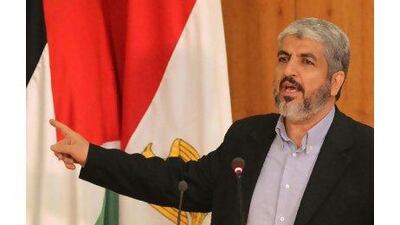JERUSALEM // Khaled Meshaal, the Damascus-based Hamas leader, has been praised for his role in the recent reconciliation process with the rival Palestinian group Fatah. Mediators involved in the agreement credit him for checking the Islamist group's hard-line impulses and pushing a policy of pragmatism.
But his calibrated gamble to soften the Islamists' image could backfire, Palestinian analysts say, if his efforts fail to unify Palestinians or gain international acknowledgment.
Mr Meshall is described as a statesman and a leader by Munib al Masri, a Palestinian billionaire involved in the reconciliation deliberations. During a ceremony in Cairo last month that formally ended Hamas's feud with Fatah, Mr Meshaal appeared to break with hard-line ranks in a speech that Mr Masri described as exactly "what the Palestinian people wanted to hear".
He appeared to tacitly agree that Mahmoud Abbas, the Palestinian Authority president, should conduct peace negotiations with Israel during the reconciliation process. He toned down Hamas's notion of resisting Israel and reaffirmed a willingness to accept a Palestinian state on only a fraction of historic Palestine.
In return for signing the deal with Fatah, which included the benefit of Egypt loosening Israel's four-year blockade on Gaza, Mr Meshaal agreed to halt rocket attacks on Israel, the British daily The Independent, reported this month.
While the process of forming a unity government may have sputtered over the issue of retaining Salam Fayyad as the Palestinian prime minister, a move Hamas opposes, Mr Meshaal is expected to finalise the deal next week with Mr Abbas.
While his approach was considered a calibrated attempt to court international support and allay Palestinian frustrations, there have been signs of tension within his own organisation.
Mahmoud Zahar, a Gaza-based Hamas official, told the Lebanese newspaper al Akhbar last month: "We didn't know and were not consulted about the position of Khaled Meshaal, and this is not the correct position. We haven't been given any chance for negotiations on behalf of us or the Palestinian people. Our programme is against negotiations in this way, because they are a waste of time."
While it is unusual for a Hamas official to openly challenge one of its leaders, Mr Zahar's comments were not the first he has made against Mr Meshaal in recent weeks. Critics say it could be evidence of a deepening rift between officials in Gaza and the group's leadership in Syria.
Hani Masri, a Palestinian political analyst involved in the reconciliation accord, said: "If there are dividends seen to be coming from the peace process, he will win against such challengers as Mr Zahar. If there is no progress, the other guys in Hamas will say to him, 'Why are you giving these concessions without anything in return?'"
The latter concern stems, in part, from residual anger over the international community imposing sanctions on the Palestinians after Hamas won a majority 74 seats in the 2006 legislative elections.
Mr Masri said Hamas's acceptance of Mr Meshaal's new tack depends heavily on the response from the international community. The reaction of the United States and the European Union in particular, both of which consider the Islamist group a terrorist organisation, is seen as a key test.
Not surprisingly, the unity accord has encountered stiff opposition from Benjamin Netanyahu, Israel's prime minister, who regularly compares Hamas to al Qa'eda.
In Israel, the group is reviled for its history of suicide bombings on buses and in crowded cafes. Mr Meshaal's stance on Palestinian refugees returning to their homes inside Israel - considered an existential threat to the country's Jewish character - has also left Israelis uneasy, said Yossi Alpher, who was an adviser to Ehud Barack when he was Israel's prime minister a decade ago.
"If you go over the last couple of years, Meshaal has made statements in interviews which appear to be a tantalising beginning," he said.
"So the question that Israelis debate is, is this the beginning of a change that somehow parallels how Fatah changed its positions gradually?" he said of Fatah's abandonment of violence.
Mr Meshaal, who almost died when he was poisoned by undercover agents of Israel's Mossad spy agency in 1997, has stopped short of formally accepting the principles required for support by the Middle East peace Quartet, consisting of the US, EU, Russia and the UN. These include renouncing violence, recognising Israel and accepting past agreements between the Palestinians and Israel.
For now, it seems that Mr Meshaal has weathered Mr Zahar's challenge.
During a meeting of Hamas's political bureau in Syria earlier this month, the group issued a statement backing Mr Meshaal's positions.
Attended by key leaders, including, reportedly, Ahmed Jabari, the head of the group's powerful military wing, the Izzad Din al Qassam Brigades, it was also seen as a rebuke of Mr Zahar.
Yet maintaining that support also largely hinges on Israel, which, while often in coordination with the Palestinian Authority, is still arresting Hamas members in the West Bank.
Forging a new Hamas image of moderation, compromise and non-violent resistance may be undermined by Israel's hostile stance on Gaza and the urge to retaliate by the group's more militant strands, said Mkhaimar Abusada, a professor of political science at Gaza's al Azhar University.
"The thing is, Israel sees Hamas as the 1988 Hamas charter," he said in reference to the group's founding document, which calls for Israel's destruction.
"But Meshaal is trying to portray a Hamas of 2011."

